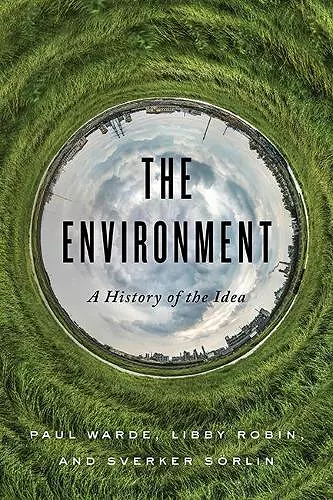The Environment
A History of the Idea
Paul Warde author Libby Robin author Sverker Sörlin author
Format:Hardback
Publisher:Johns Hopkins University Press
Published:7th Dec '18
Should be back in stock very soon
This hardback is available in another edition too:
- Paperback£22.50(9781421440026)

An in-depth look at the history of the environment.
Is it possible for the economy to grow without the environment being destroyed? Will our lifestyles impoverish the planet for our children and grandchildren? Is the world sick? Can it be healed? Less than a lifetime ago, these questions would have made no sense. This was not because our ancestors had no impact on nature—nor because they were unaware of the serious damage they had done. What people lacked was an idea: a way of imagining the web of interconnection and consequence of which the natural world is made. Without this notion, we didn't have a way to describe the scale and scope of human impact upon nature. This idea was "the environment."
In this fascinating book, Paul Warde, Libby Robin, and Sverker Sörlin trace the emergence of the concept of the environment following World War II, a period characterized by both hope for a new global order and fear of humans' capacity for almost limitless destruction. It was at this moment that a new idea and a new narrative about the planet-wide impact of people's behavior emerged, closely allied to anxieties for the future. Now we had a vocabulary for talking about how we were changing nature: resource exhaustion and energy, biodiversity, pollution, and—eventually—climate change.
With the rise of "the environment," the authors argue, came new expertise, making certain kinds of knowledge crucial to understanding the future of our planet. The untold history of how people came to conceive, to manage, and to dispute environmental crisis, The Environment is essential reading for anyone who wants to help protect the environment from the numerous threats it faces today.
Our relationship with nature goes far beyond resources, amenity, or the scientific idea of an archive we learn to read. There are, as The Environment shows, ethical complexities in how we use and abuse the planet—and in how we frame its improbable riches.
—Nature
Despite the importance in recent decades of environmentalism, environmental protection, environmental science, and so on, there has been strikingly little discussion of what exactly the environment is. Paul Warde, Libby Robin, and Sverker Sörlin examine the history of the concept as it has developed since the end of the Second World War, when they argue it took on its modern significance. The book is strongest in tracing the ways that changes in scientific institutions helped develop the modern idea of environment, as well as in its discussion of the ways that idea entered the popular imagination through works by Rachel Carson and others.
—Environmental History
This engaging and accessible book should be required reading for anyone concerned with the development of 'the environment' as a conceptual lodestone of both science and politics in the mid- to late-twentieth century. Moreover, it will be richly rewarding for anyone wishing to teach, research, or simply better understand the path dependencies and political dynamics of environmental issues today.
—Local Environment
Demonstrates the power of history to speak into the present. A wonderfully succinct, compelling, and revealing piece of writing.
—Australian Book Review
This is a highly recommended book that agricultural and rural historians will appreciate the significance of in tracing the history of the environment. It will be of interest to a wide academic readership, including historians of the environment, ideas, politics, science and technology. More importantly, this book deserves to be read by the wider public as it explains how perceptions of the environment have evolved relative to the history of the twentieth century. Understanding this history can inform contemporary responses to present and future environmental issues.
—Agricultural History Review
ISBN: 9781421426792
Dimensions: 203mm x 127mm x 25mm
Weight: 363g
256 pages